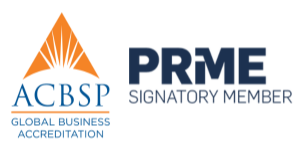-
Graduation
Master of Business Administration - MBA
-
ECTS-Points
90
-
Learning format
-
-
Start
continuously possible
-
-
Admission requirements
Bachelor's degree and professional experience
-
Language
German or English
-
Curriculum


The study program teaches skills for developing innovative, productive and sustainable solutions to constantly changing challenges.
Univ.-Prof. Dr.
Barbara Brenner
Dean of the Faculty of Business and Globalisation
Any questions?
We’re here to help.
Inquirires about blended learning

Nina Staffenberger
Administrative assistant
Inquirires about distance learning (only in German)

Sabine Niemannsgenuss
Administrative assistant
Or use our contact form:
Benefit from our study program
- Being accredited by ACBSP and being a member of PRME stands for a permanent supervision of the curriculum.
- The business school is flexible in terms of student´s application date during the summer or winter term and offers ongoing entrance to start the study program.
- Our state-of the art specialized MBA program has allowed us to instill an enterprising culture into our modules with a strong practical orientation.
-
accredited/certified
-
flexible
-
practice-oriented
Accreditation
Excellent further education at the highest level!
This continuing education study program is internationally accredited with ACBSP.
The Danube Business School is a member of the PRME Initiative of the United Nations.

Learning Format
Blended learning option
General Management Modules (Blended Learning)
Specialization (Blended Learning)
Continuing education tuition fee: EUR 23.900,--
Distance learning option
General Management Module (Distance Learning)
Specialization (Blended Learning only)
Continuing education tuition fee: EUR 16.900,--
Duration
The MBA program is also offered as a full-time study (3 semester).
Curriculum
The study program contains 90 ECTS credits:
- 12 compulsory modules General Management (36 ECTS)
- 3-5 elective modules General Management (15 ECTS)
- Specialization modules (24 ECTS)
- MBA Thesis (15 ECTS)
MBA - Core Curriculum
The core modules of the MBA Program offer a coordinated General Management education aligned with international academic standards. This core curriculum can be completed as a blended learning program in a part-time or full-time mode.
MBA - Specialization Curriculum
The specialization modules focus on industry-, function- or topic-specific content and enable the transfer of knowledge between experts in their field or industry. In addition to specific industry contexts or functional areas, current business related cross-cutting topics such as agility, digitalization or sustainability can also be addressed in depth.
MBA - Thesis
A MBA-Thesis must be written at the end of the MBA Program. This independent written work must be composed according to academic criteria and is intended to develop the implementation of a specific aspect of the MBA Program content to a practically relevant issue. With the MBA-Thesis, students should demonstrate that they are able to develop solutions systematically for a practical relevant issue by applying the acquired knowledge of the Program.
Learning Outcomes
Graduates of the MBA Core Curriculum are
enabled to:
- Discuss interrelationships between the core disciplines of business administration and aspects of cross-cutting economic and societal issues,
- deal with topic-, function- and/or industry-specific contexts within the chosen area of specialization,
- to categorize the methods of action acquired in business practice by dealing with the theoretical foundations and to link them with new findings
- to apply theoretical knowledge from the core disciplines of business administration, econom their chosen specialization in independent planning and implementation in their areas of work and in projects as managers,
- identify key cross-sector challenges and develop appropriate approaches,
- explain relevant aspects with regard to gender and diversity in various core business disciplines,
- analyze their personal and professional management skills in self-reflection and derive potential for development from this,
- systematically develop solutions to practical problems in an original written paper using the knowledge they have acquired.
Specializations taught in German
Specializations taught in English
-
Contents
The Music and Entrepreneurship Certificate Program is an international program taught in English designed to provide students with knowledge and skills to pursue a career in the music business sector. Classes include topics such as the economics of culture, copyright and regulation in the music business, artists management, the impact of technology, and digital marketing and sales.
The program is suitable for graduates who wish for example to pursue a career as entrepreneurs or artist managers, or established professionals wishing to update their knowledge, gain an up-to-date oversight of the music business sector, as well as network with international colleagues, be they lecturers or students.
It is possible to first complete the Certificate Program “Music and Entrepreneurship". The completed continuing education program can then be credited towards the “Music Business and Culture” continuing education program in terms of content and financing
-
Contents
Music Organisations is a Certificate Program that provides specialized, up-to-date and cutting-edge knowledge in a variety of theoretical and practical issues pertaining to music organisations. The programme, taught in English, includes topics regarding the structures and governance of music organisations, management and leadership, communication and PR for music organisations, festivals and events management, and audiences in the culture and music sectors.
It is taking into consideration developments in the area of music organisations in Europe and worldwide, making it an idea choice for young graduates who wish to pursue a career in a music organisations, or established professionals who want to acquire an academic knowledge and degree in the field.
Study Program Director
MBA Specializations
To informally clarify whether the intended study program is right for you and you meet all admission requirements, please contact the respective study director.
MBA Agile Organizations & Collective Leadership
Study Program Director: Dr. Birgit Feldhusen
Administrative Assistant: Nicole Puszter
MBA Aviation Management
Study Program Director: Dr. Doris Burger
Administrative Assistant: Michaela Aschauer-Schopper, MBA
MBA Biotech, Pharma & MedTech Management
Study Program Director: Assoz. Prof. Dr. Jens Hartmann
Administrative Assistant: mag. Karin Strobl, MSc
MBA Business Controlling & Financial Management
Study Program Director: Mag. Dr. Anton Zeiner
Administrative Assistant: Elisa-Marie Obiltschnig, BA
MBA Datenmanagement - Data Steward
Study Program Director: Mag. Dr. Gregor Eibl, MSc
Administrative Assistant: Stephanie Amon
MBA Digital Marketing & Customer Experience
Study Program Director: Mag. (FH) Tina Mock
Administrative Assistant: Elisa-Marie Obiltschnig, BA
MBA Digitale Transformation in Wirtschaft und Verwaltung
Study Program Director: Mag. Corinna Raith
Administrative Assistant: Stephanie Amon
MBA Emerging Technologies
Study Program Director: Mag. Dr. Alexander Pfeiffer, MBA MA
MBA Human Resources
Study Program Director: Dr. Werner Kienast, MBA
Administrative Assistant: Birgit Gruber
MBA Information Security Management & Cyber Security
Study Program Director: Mag. Mag. Günther Kainz, Bakk.
Administrative Assistant: Sandra Pieringer
MBA International Business
Study Program Director: Dr. Doris Burger
Administrative Assistant: Michaela Aschauer-Schopper, MBA
MBA International Real Estate Valuation
Study Program Director: Dipl.-Ing. Rainer Altmann, MSc
Administrative Assistant: Mag. Dipl.-Ing. (FH) Elisabeth Neumayer
MBA KI-Kompetenz
Study Program Director: Dr. Diogo Campos Sasdelli, M.A.
Administrative Assistant: Maria Schuler
MBA Leadership
Study Program Director: Mag. Helena Sieberth
Administrative Assistant: Christa Haselbacher
MBA Music and Entrepreneurship
Study Program Director: Olga Kolokytha, PhD MA
Administrative Assistant: Andrea Kaufmann
MBA Music Organisations
Study Program Director: Olga Kolokytha, PhD MA
Administrative Assistant: Andrea Kaufmann
MBA OP-Management
Study Program Director: Mag. Michael Ogertschnig, MBA
Administrative Assistant: Gerlinde Weber, MSc
MBA Personalpsychologie
Study Program Director: Dr. Werner Kienast, MBA
Admministrative Assistant: Birgit Gruber
MBA Rettungsdienstmanagement
Study Program Director: Mag. Michael Ogertschnig, MBA
Administrative Assistant: Mag. (FH) Ariane Walzer
MBA Sales Management
Study Program Director: Mag. (FH) Tina Mock
Administrative Assistant: Angela Schmelz
MBA Smart Factory
Study Program Director: Mag. Corinna Raith
Administrative Assistant: Stephanie Amon
MBA Supply Chain Management
Study Program Director: Mag. Corinna Raith
Administrative Assistant: Stephanie Amon
MBA Sustainable Management
Study Program Director: Mag. Romana Bates
Administrative Assistant: Nicole Puszter
MBA Technik im Gesundheitswesen
Study Program Director: Mag. Michael Ogertschnig, MBA
Administrative Assistant: Gerlinde Weber, MSc
Downloads
Here you can find more information about the MBA study program.
Application
Admission requirements
- Completed university degree
- and two years of relevant professional experience
You can find contact persons and application information on the respective study pages of the specializations.
Tags
